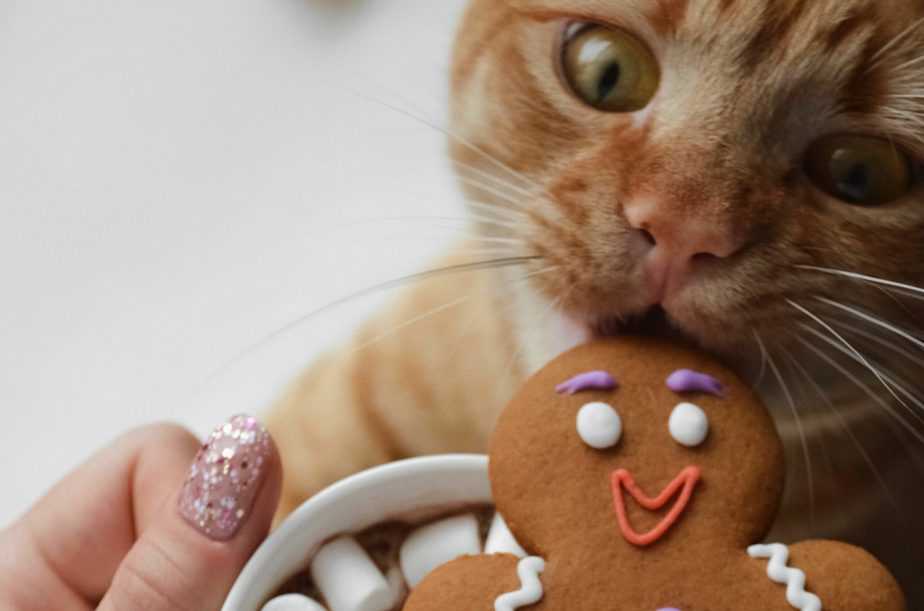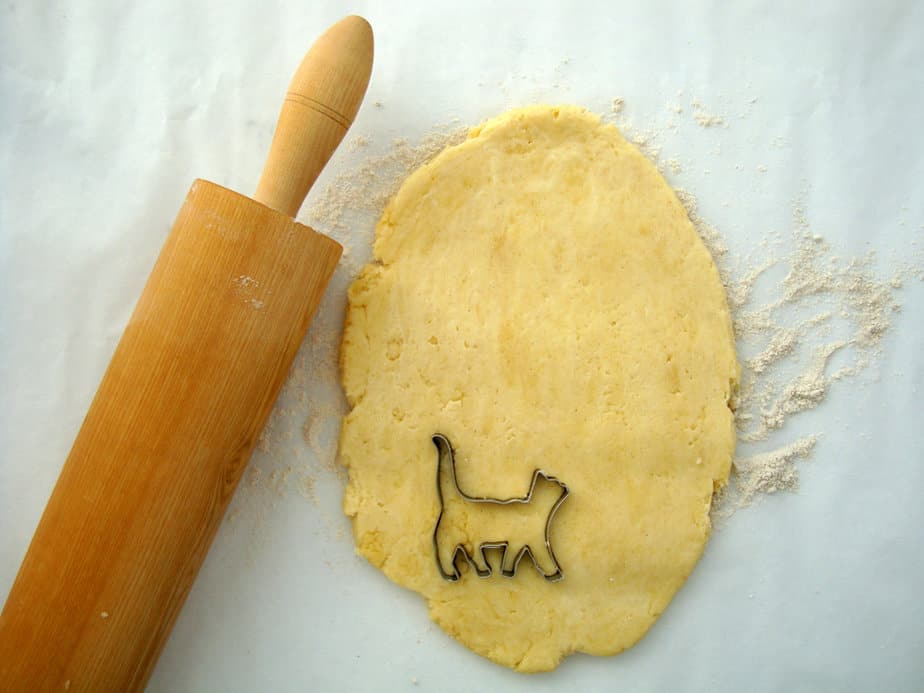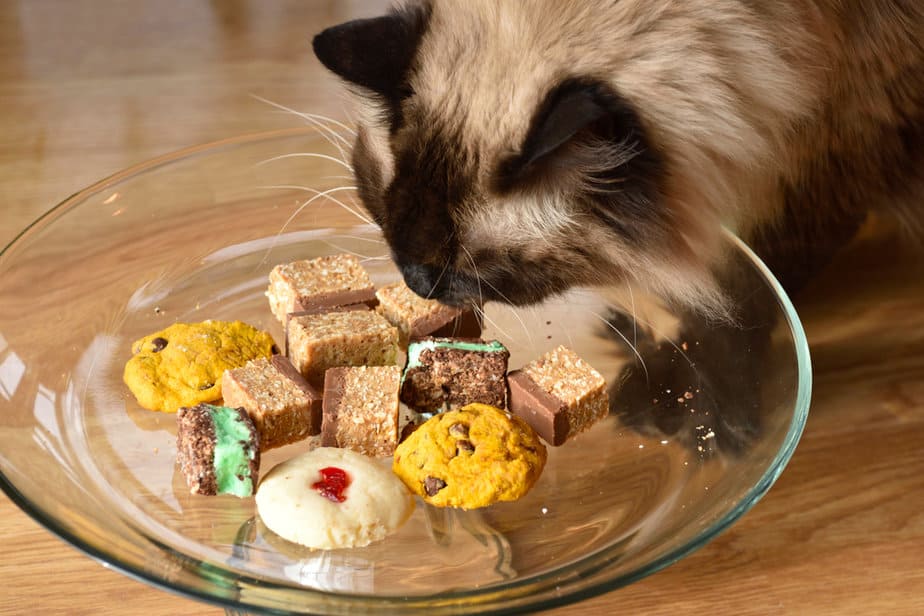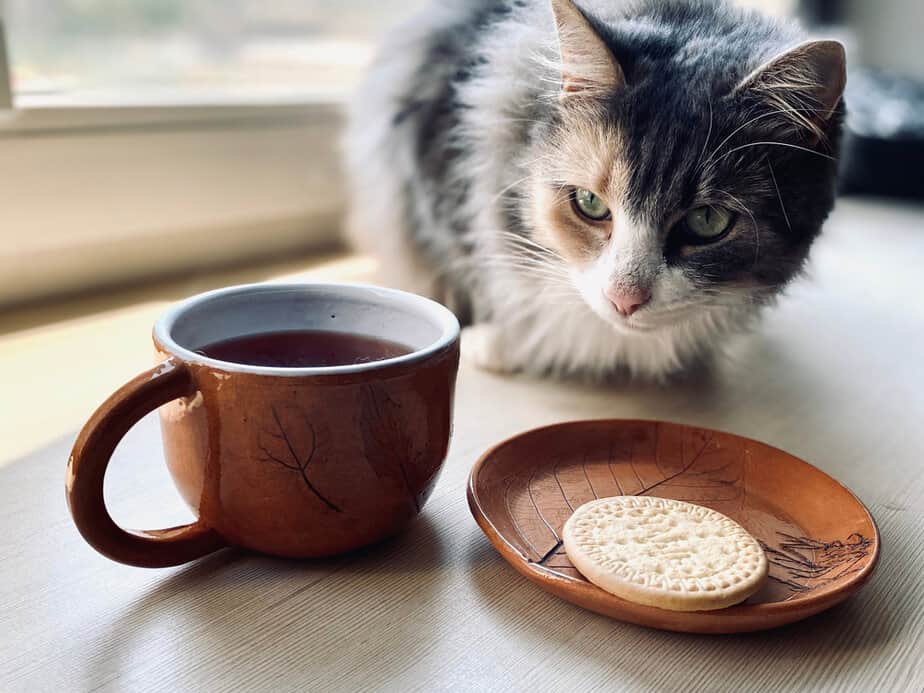📖 Table of Content:
- Cats and cookies
- So, can cats eat cookies?
- Three reasons why cats can’t eat cookies
- Can cats eat peanut butter cookies?
- What about butter cookies?
- Can cats eat chocolate chip cookies?
- What about sugar cookies?
- Can cats eat Oreo cookies?
- What about shortbread cookies?
- And what about raw cookie dough?
- Cats can’t eat cookies, but…
As a pet parent, you know well you’re not supposed to leave a plate of deliciously crunchy cookies on your kitchen counter. Your four-legged friend won’t even wait for you to leave the room before she storms in there and snatches them right before your eyes. Argh, can cats eat cookies?
“One little bite won’t do her any harm”, you think to yourself as you watch her walk away with your baked-to-perfection chocolate chip cookie. “Oh, wait”, a moment of panic finally settles in. “Cats can’t eat chocolate!”
Unfortunately for everyone involved, you’re entirely correct. Your furry friend isn’t supposed to eat chocolate and she certainly isn’t supposed to eat cookies. According to our friends over at the ASPCA, some of the most common cookie ingredients aren’t considered safe for your cat.
It’s your responsibility to provide your feline friend with everything she needs to be happy and healthy. She needs lots of cuddles and kisses for the first part. But, she also needs lots of delicious and nutritious cat-friendly food for the latter.
So, you made the right call when you decided to look up “can cats eat cookies.” Not only are these mouthwatering morsels dangerous for your furry friend, but they’re also miles away from what she’s supposed to be eating on a regular basis.
Scroll down and learn everything you need to know about the complicated relationship between cats and cookies. Let’s start from the beginning!
Cats and cookies
As a pet parent, chances are you’ve heard the famous “cats are obligate carnivores” line on more than one occasion. What do we mean by that? Scientifically speaking, cats should consume meat, animal protein, and animal-sourced nutrients for the most part.
When you think about it, your furry friend spends most of her days enjoying herself on your sofa waiting for you to feed her carefully crafted cat food and surprise her with a well-deserved cat treat. But, she wouldn’t be doing that if she was in the wild, now would she?
You might be wondering “well, what does that have to do with cookies?” Well, cats are supposed to eat heaps of meat as the main part of their diet. They don’t really need carbohydrates, fruits, and vegetables for the same things humans do.
They derive their energy from protein, and (when they’re in the wild) they get most of their vitamins, minerals, and antioxidants from the stomach contents of their prey. While that might sound gross to your precious purrincess, that’s what she was biologically predisposed to do.
Cookies don’t really fall under that category. This means your feline friend would have a hard time trying to digest them since her digestive system isn’t equipped to deal with whatever ingredients you can find in most cookies.
And, cats can’t even taste sweet things! Not only does their digestive system not have the necessary enzymes to process carbohydrates, but their tongues also don’t have the necessary taste receptors to taste sweet things.
They only have a few hundred taste buds. That’s pretty small in comparison with the thousands of taste buds most humans have. Doesn’t that sound like the weirdest thing since cats are so much more superior than humans in pretty much everything else?!
So, can cats eat cookies?
It’s pretty clear your feline friend isn’t interested in your freshly baked shortbread cookies because you did such a great job. She’s interested in them because she’s a curious creature and she wants to check whether they’re worth the hype.
So, can cats eat cookies? Of any kind? Here’s the thing, cookies are typically made with a bunch of ingredients that might send your cat running to her litter box. Or even worse, that might send her to the nearest emergency animal center. Here’s a list of some of the ingredients we’re talking about.
- Butter (unsalted butter, salted butter, margarine)
- Sugar
- Salt
- Artificial sweeteners (Xylitol)
- Eggs
- Flour
- Vanilla extract
- Chocolate (dark chocolate, milk chocolate, white chocolate, chocolate chips)
- Peanut butter
- Nuts
Unfortunately, most of these ingredients are considered toxic to cats. They can cause an array of digestive issues including an upset stomach, diarrhea, and vomiting. But, they can also lead to gastrointestinal problems, weight gain, obesity, and diabetes in the long run.
It’s safe to say that cats can’t eat cookies. It’s your responsibility to take care of your cat’s safety. And it’s better for everyone to keep those cookies hidden out of her paw’s reach. While small quantities of cookies (one or two bites) shouldn’t cause too much harm, it’s better to be safe than sorry.
Three reasons why cats can’t eat cookies
You came here looking for an answer to your “can cats eat cookies” question, but you still need more convincing because your cat keeps giving you that look? Don’t worry, we’ve got your back.
It’s pretty clear that most of the ingredients we’ve talked about beforehand aren’t favorable for your cat. But, you might be wondering what happens if and when she does eat them. Will she experience minor bumps on the road or will she need an emergency vet visit?
1. Bad ingredients
What’s the number one thing to remember when you’re trying to figure out whether cats can eat cookies? Take a look at the ingredients list! Let’s be honest, most cat owners know which human foods put their cat’s life at risk and which get a passing grade.
For instance, ingredients like butter, margarine, and oil have a high-fat content. They might cause your furry friend to gain weight and experience heaps of health problems in the long run. Sugar, salt, and flour might lead to diarrhea, vomiting, and other digestive issues.
And then you have chocolate and vanilla extract which are incredibly toxic to cats! Vanilla extract contains a high level of ethyl alcohol which can lead to alcohol poisoning. Chocolate, on the other hand, contains theobromine which can increase your cat’s heart rate and cause seizures and tremors.
Both of these ingredients, when consumed in excessive amounts, can be fatal to your precious pet. It’s safe to say that it’s better to avoid any situation in which she might be tempted to scoff down any leftover cookies you might be keeping within her reach.
2. Gastrointestinal issues
Here’s the thing, regardless of the ingredients list your feline friend isn’t likely to experience adverse reactions from one bite. Cats can’t eat cookies as a regular part of their diet, but a “just this one time” sweet snack shouldn’t send her running to her litter box.
However, it’s better to be safe than sorry when it comes to your cat’s health. As mentioned in one of the previous paragraphs, chocolate chip cookies and other cookies that contain toxic ingredients don’t belong anywhere near your cat’s reach.
You can’t predict whether she’s going to take one bite or scoff down the entire jar. You might be looking at hours and hours of excessive thirst and urination, incoordination, weakness, drooling, vomiting, and diarrhea.
Consult with your vet before making any significant changes to your cat’s diet, but… Contact your vet immediately if you have any reason to believe she might have eaten a chocolate chip cookie or a shortbread cookie. It’s better to be safe than sorry!
3. Allergies and intolerances
Last but not least, there are certain ingredients that might trigger your cat’s allergies and intolerances. Not only can cats be allergic to different nuts and seeds, but they can also be intolerant to lactose. Yes, you read that right!
Kittens can process and break down their mother’s milk, but once they’re fully grown they lose the enzyme that’s responsible for that part of the job. They no longer require milk as a regular part of their diet so they don’t need the enzyme to break it down.
What happens when a lactose-intolerant cat eats a cookie that was made with milk (or any other dairy product)? Some of the most common symptoms she might experience are tummy ache, vomiting, and diarrhea.
So, it certainly doesn’t hurt to repeat that you should consult with your vet before making any significant changes to your cat’s diet. Cookies are always a great idea for you, but it seems as if they’re never a good idea for your cat.
Can cats eat peanut butter cookies?
There are so many different types of cookies and you might be wondering whether any of them are safe for your four-legged friend. Can cats eat peanut butter cookies, for instance?
No, peanut butter cookies shouldn’t be a regular part of your cat’s diet. They’re high fat, high sodium, and calorie-dense. And that certainly doesn’t sound like the best combination when it comes to your cat’s nutritional needs.
They can also lead to allergic reactions (yes, cats can be allergic to peanuts), gastrointestinal upset, and artificial sweeteners toxicity (yes, xylitol can be toxic to cats). And when you give it a second thought, there’s pretty much nothing good about feeding peanut butter cookies to your furry friend.
What about butter cookies?
No, cats can’t eat butter cookies. The main ingredient of these delicious delicacies, butter, doesn’t seem to be particularly gentle on your cat’s tummy. Not only are cats lactose intolerant, but they also can’t process that much fat without serious repercussions.
Don’t get me wrong, your cat can take a bite of your butter cookie without having to run to her litter box. But, you should probably stash the rest someplace she won’t be able to reach. You don’t want her to eat too many butter cookies at once – speaking from my own experience.
And, don’t feed your cat cookies before you consult with your vet.
Can cats eat chocolate chip cookies?
Eating chocolate cakes, chocolate chip cookies, or anything covered in chocolate in front of your four-legged friend seems like the worst idea you can ever have. Cats and chocolate don’t go together, and you can only hope you never learn that the hard way.
Dark chocolate (or even baking chocolate) seem to be the worst out of the bunch since they contain the most theobromine and caffeine. But, your cat should steer clear of pretty much anything that contains any type of chocolate.
According to our friends over at the ASPCA, chocolate seems to be the worst thing you can find in your cat’s mouth. Symptoms of chocolate poisoning (yes, that’s a thing) include vomiting, diarrhea, restlessness, weakness, hyperthermia, tachycardia, and seizures.
So no, cats can’t eat chocolate chip cookies.
What about sugar cookies?
Sugar cookies typically contain sugar, flour, butter, eggs, and vanilla. While they’re not as bad as chocolate chip cookies, they simply don’t bring any nutritional value to your cat’s table.
Additionally, vanilla extract can be pretty harmful to cats when consumed in excessive amounts. Even on the off chance that your sugar cookies don’t contain any vanilla extract, they still contain a bunch of refined sugar, butter, and flour.
Too much fat and too many carbs can lead to heaps of health issues such as weight gain, obesity, diabetes, heart disease, and liver disease. While one sugar cookie won’t cause any of these health issues, who’s to say your curious creature won’t eat more than one!?
So no, cats can’t eat sugar cookies.
Can cats eat Oreo cookies?
You can guess this one yourself, but no, cats can’t eat Oreo cookies. Remember what we said about chocolate being toxic to cats? While Oreos don’t typically contain any chocolate, they do contain cocoa powder.
Too much cocoa powder can raise your cat’s blood pressure and blood sugar levels. Not only that, but the cocoa powder can also lead to all sorts of cardiovascular and gastrointestinal diseases when consumed over a longer period of time.
Unfortunately, Oreo cookies contain A LOT of cocoa powder which makes them harmful to your four-legged friend. You can always choose to look at this problem from the bright side, this simply means more Oreos for you and less (or none) for your cat.
What about shortbread cookies?
Your grandma’s favorite shortbread cookies don’t make the cut, either. They’re packed with vanilla, butter, and sugar. These ingredients can only lead to a bunch of health problems when consumed over a longer period of time.
One shortbread cookie every once and a while shouldn’t cause any adverse reaction (consult with your vet beforehand), but… It’s better to keep the cookie consumption to a minimum. After all, cats with sensitive tummies are at risk of experiencing discomfort, diarrhea, and vomiting.
Cats can’t eat shortbread cookies. It’s safe to say that you should take your ice cream and cookies and eat them somewhere far away from your curious creature.
And what about raw cookie dough?
No, no, and once again, no! Cats can’t eat raw cookie dough for a number of reasons. But, the most important one does have a scientific explanation…
When your cat consumes raw dough, the yeast that’s inside the dough begins the process of something that’s typically referred to as alcoholic fermentation.
Technically speaking, the yeast combined with the bacteria and microorganisms that can be found in your cat’s stomach converts the sugar from the cookie dough into alcohol and carbon dioxide. And, you guessed it, both of these things are toxic to cats.
Cats can’t eat cookies, but…
You can always make them from scratch and surprise your four-legged friend with a tasty treat! Trust me, there are so many cookie recipes to choose from. You’re bound to find something you can share with your cat without that all too familiar “can cats eat cookies” mini heart attack.








